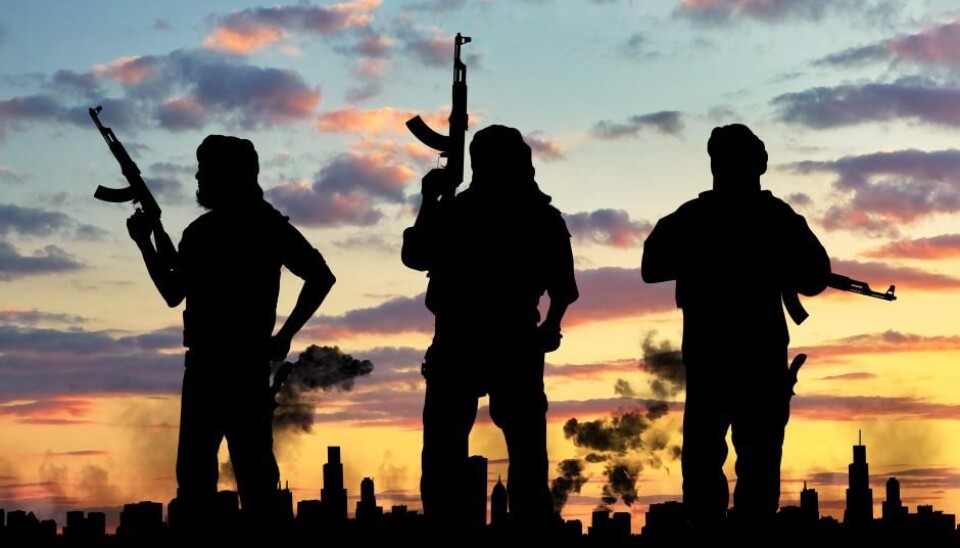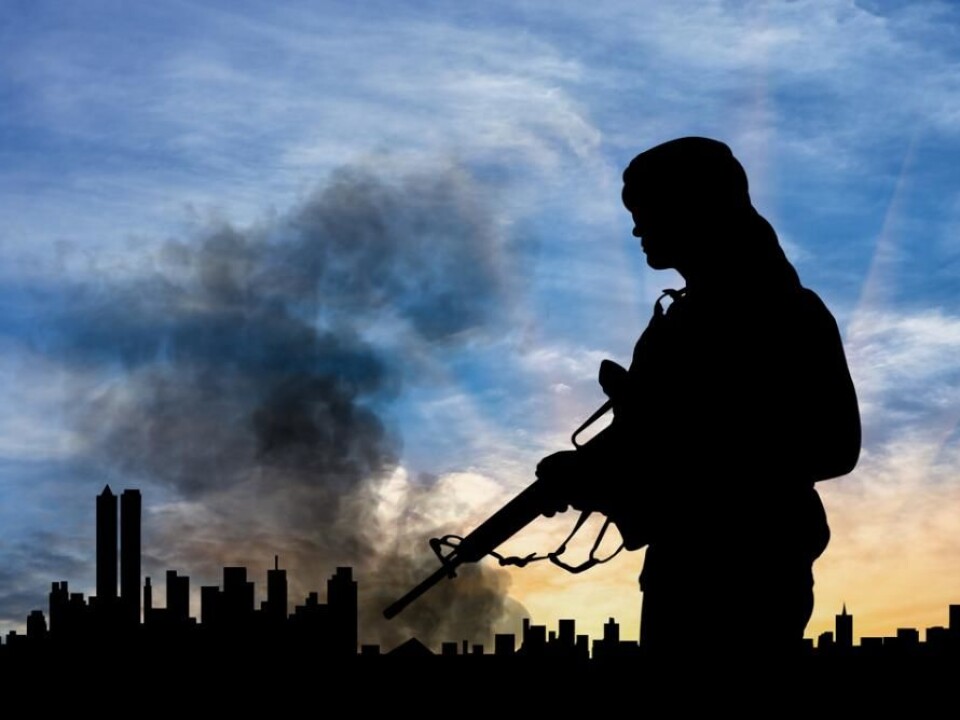
God's own weapons: Danish foreign fighters tell why they are fighting for jihad
A Danish scientist has followed six Danish foreign fighters to try to understand, what makes people leave security and safety in Denmark to go to war in the Middle East.
In the picture I am looking at, the two young men currently sitting in front of me, are standing on an Iraqi battlefield. They are wearing army gear of unmatching camouflage. They each have their arm around a clerical militia commander.
Elwan and Yosef may look at ease in the photos, but they simultaneously look out of place. Their tank tops are cut to reveal their biceps and their sports shoes stand out against the official-looking uniforms of their stern-faced commanders.
Back in Denmark, Elwan and Yosef flick past ‘selfies’ of them posing on landscape hilltops, sunburned in shades of dark red with sunglasses on their foreheads, looking as much the cliché of European tourists as the foreign fighters their story would reveal them to be.
Elwan and Yosef are two of the six Danish foreign fighters I followed for several years, to come closer to an understanding of what happened when more than 150 Danes and 4,000 Europeans went to the Middle East to join Islamist militant movements fighting in the conflicts that followed in the wake of the ‘Arab Spring’.

These foreign fighters appear to come from all strata of society and represent a broad spectrum – from young idealist to pious Salafi-jihadists or hardened criminals.
Some sought a completely new life fighting jihad, while others went for the duration of their semester holiday.
Ideology, social marginalization or both?
Journalists, policy makers and academics alike were taken aback by this phenomenon – why would young men who was born or brought up in the Danish welfare state choose to replace its comforts with the violent scenes of a far-removed conflict?
As a choice, it goes against liberal democratic logic of striving for ‘the good life’, as it is generally understood as one defined by stability, safety and possibility for economic advancement. At the heart of this puzzle are also immediate concerns over how such motivations could reflect a desire to engage in terrorism ‘at home’.

Debates on these questions have evolved around whether its ‘root cause’ is a religious/ideological radicalisation, or the consequences of socio-economic marginalisation. Although these two parts of the literature are not mutually exclusive, and many studies consider both factors, they appear to bite each other’s tail.
Are such violent actions a consequence of radicalisation and dogma inherent in a particular religious ideology, or does the religious ideology merely provide a legitimising narrative for violent actions that grow out of frustrations caused by social marginalisation?
What do they think about going?
Although ‘Why do they go’ is an important question, it may not be the best one to ask as a researcher, because of its in-built orientation towards simple answers to a difficult question.
Instead I sought to answer the related question of how becoming a foreign fighting came to seem meaningful and purposeful to each person I came to know. This meant taking seriously religious ideology while also remaining sensitive to their social reality.
Through my fieldwork and interviews, I broadened the focus to include their life stories prior to leaving, their experiences on the battlefield as well as of returning.
What I encountered in my study was neither brainwashed cult members nor bloodthirsty terrorists but a far more human story about seeking out a chance at glory by fighting what they thought of as jihad.
Rather than being mindlessly radicalized, these individuals actively sought out jihad as a vindication of the frustrations and anxieties of their lives. Therefore, their choice to fight jihad related as much to their position within Danish society as it did to religious creeds or Middle Eastern politics.
God’s own weapons
Now, let me introduce you properly to Elwan and Yosef, as well as the other participants. Elwan and Yosef are friends and grew up together in the concrete surroundings where we met.
Their faces carry old scars, and their tattooed arms tell their own story. They have led chaotic existences on the fringes of society and appears as if they are not trying to succeed in life as much as avoid major tragedy.
They were kicked out of school, have criminal sentences and are estranged from their families. Their time is mainly spent lifting weights in the local gym. As I meet them, they are looking to travel out soon again, and going to the gym has gained a whole new meaning to them.
Working out is no longer just about body image and vanity, but a form of worship of God by improving their bodies as His fighting tools.
A chance at absolution
A similar transformation happens in how they see themselves. Whereas before they were merely ‘thugs’ hustling to get by, they now see themselves as the soldiers of God. Elwan was not exactly looking forward to standing before God on judgement day and welcomes fighting jihad as an unexpected chance to redeem himself of his former sins.
As well as forgiving all sins in the afterlife by the first drop of blood, Elwan explains, fighting jihad also levels him with society’s high achievers; efforts towards earning status through education or employment are insignificant compared to jihad in his eyes.
The Nørrebro gang leader, Abde, puts it bluntly, that “Some people have died of my hands, and that is a big problem when I meet Allah … It’s not good enough just praying with all the shit I have done”, hinting at several interrelated levels of his upcoming journey to fight in Syria.
It relates at once back in time to his former sinful deeds, to the near future when he will do ‘more’ than praying (i.e. fighting jihad), and into the eternal life beyond when he meets his maker. By fighting jihad in Syria, Abde seeks to be absolved of his past sins and live and die with a less problematic relationship to God and his own conscience.
Fighting thereby works on several levels, relating to a political reality in the Middle East as well as to Abde’s own life.
Being a permanent suspect
Yet, only half of the six foreign fighters I follow have criminal backgrounds; many have led rather unremarkable and ‘straight’ lives before going. They are enrolled in education or hold stable jobs. Their frustrations were more indirect, yet a very real presence in their lives prior to going to fight.
A telling example is how Ameer relays missing study group sessions at the main public library, because of his fear of being profiled according to Omar el-Hussein’s stereotype by the heavily armed guards permanently installed by the synagogue entrance since el-Hussein’s attack.
He would carefully consider in advance what to wear, foregoing a ‘hoodie’ or other street wear. Or if the library visit was planned spontaneously, he would start to feel queasy and get sweaty palms as he turned down the narrow side street across from the Copenhagen Round Tower, but also focused on seeming calm, as he is worried that nervousness could be seen as displaying suspicious behaviour. Sometimes he would simply turn around and miss the study group session.
A chance at vindication
These experiences are mirrored by Samir who tells of having been stopped on the street as a teenager while walking with his friends ordered to take turns opening each other’s jackets and patting down each other’s trousers, the police officer remarking ‘Better you do it, if one of you is wearing a suicide vest’.
‘How do you look each other in the eyes after that?’ Samir asks rhetorically. He adds that he and his friends stopped spending time at playgrounds after police had approached them there and asked if they were selling drugs to minors – when they themselves were barely teenagers.
His tone of voice turns dark as he tells about being stopped along with his younger brothers on the way home from the grocery shop, bags of vegetables in hand, to be quizzed about being a gang.
To bring out their nuances, let’s contrast Abde’s statement about absolution for murder against Imran saying, “I thought that if I did this [fighting in Syria] I would come back with a straightened back […] To be, like, proud, shake whatever they think of me off my shoulders.”
Like Abde, Imran also expects to relate differently to himself after having gone to Syria, as having achieved something he could be proud of. Yet this change is not related to any crimes he has done previously in his life, but to how the way he feels perceived in society weighs him down.
Jihad as violent self-realisation
Becoming a foreign fighter offered the promise of a solution, however partial and ultimately self-contradictive, to feelings of frustration regarding their moral place in the world. They attach to the trip a chance to ‘become good’ by ‘doing good’.
Rather than having been radicalised into a certain dogmatism, these men were actively shaping the purpose fighting abroad would serve for them.
Yet, their fighting represented an ambiguous redemption, because the meanings that the journeys have for these men are negated by the communities and wider society to which they return.
They are not greeted as returning heroes by their families or local communities upon return, but rather shunned, and excluded from marriage opportunities or the local mosque. Yet, giving in to social judgment would for some mean giving up the only thing they ever felt proud about.
Instead they cling to their view of having fought a moral fight and condemn the rest as hypocrites, separating them further from the social fabric they were already struggling to find their place in.
What can we learn from talking to people?
This glimpse into the experience of becoming a foreign fighter shows how religious creeds, Middle Eastern conflicts and frustrations regarding their positions within Danish society came together in how these men were actively shaping the purpose they attached to their journeys.
Furthermore, it shows that talking to people to understand the logics of their (violent) actions may prove concepts such as radicalisation lacking in their abilities to grasp the many facets of the human experience.
Finally, it suggests that when researchers show willingness to adopt new perspectives, seeing our own society through different lenses, we may uncover uneasy positions within it otherwise not visible to us.
Read this article in Danish at our Danish sistersite Forskerzonen at Videnskab.dk





